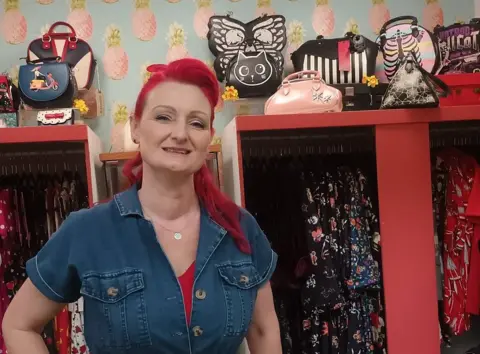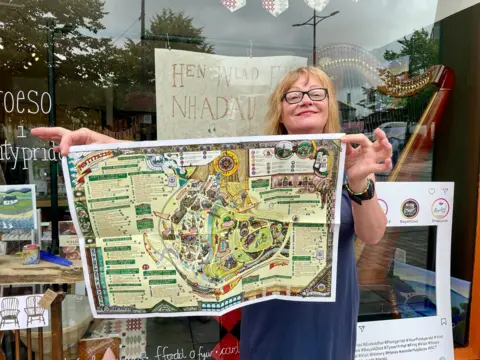After slow start, Pontypridd embraces Eisteddfod
 BBC
BBCBusinesses in Pontypridd had seen a “slow start” when the National Eisteddfod began in the town last weekend, but “things have built every day since then”, said a shop owner in the indoor market.
“Initially people were bypassing the town, and going straight to the maes [field site], but things have really improved in the last few days,” said Angela Robinson, who runs Hulaballoo, a vintage clothing store.
Business owners also said they hoped the event would create a “legacy” and help the town recover from devastating floods brought about by Storm Dennis in 2020 that saw a number of businesses close.
This year’s main event is being held in Pontypridd’s Ynysangharad Park, with other “fringe” events taking place throughout the town.
Pontypridd, in Rhondda Cynon Taf, last hosted the Welsh cultural event in 1893, narrowly defeating the US city of Chicago, which had been considered as a location to increase Wales’ international profile.
An estimated 3,000 Welsh people lived in and around Chicago at the time, mainly working in the farming and mining industries of the American Midwest.
Ahead of this year’s event, there was initially scepticism from some about Pontypridd hosting the event, but Angela, speaking to the BBC alongside her husband Greg, said this had largely been a “misunderstanding” and down to a lack of communication about the benefits the event could bring to the town.
“I think this is one of the first eisteddfods that’s actually been held in the middle of a town, and there are some lessons to have been learned there, that they can utilise the town as well, and not just send people straight to the maes,” said Greg.
He said organisers and local people had made an effort to advertise the town to visitors, which has had a “massive impact”.
“It’s now been really embraced in the town,” he said.
“The weather has really helped - until today,” Angela added, laughing, as rain hammered on the market roof during a washout on Thursday.
She also said she hoped the event would bring longer term benefits to Pontypridd, which “really suffered” after the 2020 floods.
“As business owners, we hope the eisteddfod will leave behind a bit of a legacy, so that people come here and enjoy it, but also come back to visit us afterwards,” said Angela.
“We love our town and we want to show it off – the eisteddfod has given us the chance to do that,” she said.

Keith Woods has spent several decades as the manager of Pontypridd Market, which has been under private ownership since the 1870s.
He said the market has seen a “massive change” over the years, and was a source of pride for Pontypridd residents.
He added that there had been a “big surge in business” during the eisteddfod, particularly for restaurants and cafes.
“But it’s not just about this week. We hope it’ll create a legacy about the town and encourage people to come back,” he said.
As well as the main festival – which includes talks, live music and performances – there are also other “fringe” events taking place in Pontypridd, including one near Martha’s Homestore, a retail store run by Jayne Coleman.
She said local businesses had benefited from a map – “a work of art really” - created by local artist Becky Davies that showcases independent businesses in the town.
“Yesterday was my second busiest day ever,” she told the BBC on Thursday.
“It’s been fantastic – everyone has said they have loved having the maes, but also the town nearby.”
A key aim of the eisteddfod is to encourage the growth of the Welsh language, and organisers hope it will contribute to increased use of Welsh in and around Pontypridd, an area that would not be considered a heartland for the language.
Walking around Pontypridd this week, the BBC overheard a number of conversations of people asking those they were with to teach them a few words in Welsh.
“See, you’re basically fluent now,” joked one woman to an older relative after teaching them a few words as they walked away from the festival site.
Kathy Jones, a Welsh language tutor, said the town had “embraced” the festival, with many shops putting up Welsh language signs.
“You can really see the benefit of having the eisteddfod here. People come here and they’ll go away and want to learn more about [the Welsh language],” she said.
